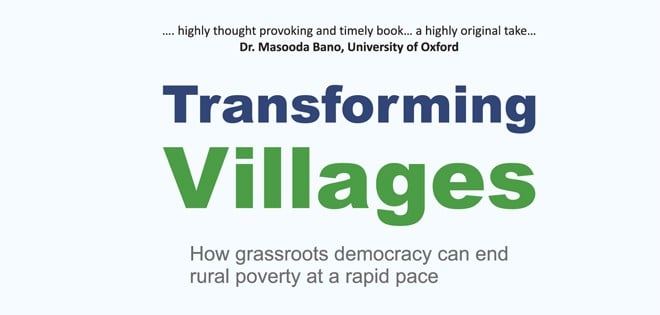
A prescriptive book for the professional development vendors

The village in South Asia has been a topic of scholarly debate ever since the colonial encounter. Land was not commodified before the arrival of the British in South Asia. Land belonged to the tillers of the land as long as they cultivated it and used their produce to pay tribute to the king. If there was no tilling, there was no tribute to be paid. Land itself was not something to be taxed; the produce was. This remained the case informally even after the colonial state was established.
The old customs persisted in the form of the Commons (the Urdu word shaamlaat is still expressed by the rural population) and unoccupied land remained available to the people even after the foundations of the modern state were laid down.
The evidence of such practices is still available in those areas where spare land becomes available after the rivers have spent themselves after the annual floods. Many people use the river beds for winter crops but the land cannot be turned into commodity. This is cultivation before the arrival of the idea of history, before the arrival of exchange economy, before the transformation of surplus into profit, and before the commodification of all life relations.
Karl Marx assigned himself the task of interpreting this rural life because it "transformed a self-developing social state [the lives of human beings] into never changing natural destiny" and he favoured what England was doing in South Asia: "England, it is true, in causing a social revolution in Hindostan, was actuated only by the vilest interests, and was stupid in her manner of enforcing them. But that is not the question. The question is, can mankind fulfil its destiny without a fundamental revolution in the social state of Asia? If not, whatever may have been the crimes of England she was the unconscious tool of history in bringing about that revolution" (Marx, New-York Daily Tribune, June 25, 1853). But Marx did not understand South Asian rurality because he was a rational man, steeped in the logic of the state, who wanted the state to work for those who have to sell their labour.
Statism and South Asian rurality have never been compatible. The rural population always tries to bypass the state by cajoling it, by bringing it into the fold of the family, by bribing it, by seducing it into other forms of social relations. In other words, the rural people do not want the state to act like the state at all because they do not know what to do with power that is outside their "pre-historic" ways of existing. Alienated bureaucratic power does not make sense to the people of South Asia without "education."
The author of this book, Transforming Villages: How Grassroots Democracy Can End Rural Poverty at a Rapid Pace, does not understand the nature of political power in South Asia where the state is always in crisis. South Asia has always tried to subsume this unfamiliar form of power under the familiar forms of power. Why is it that the institution of the family and the tribe are more powerful than the state in South Asia? Are not the Sharifs, the Zardaris, and the Bhuttos, the Bugtis, the Mengals, and the Gandhis essentially representing the institution of the family and the tribe?
The situation is so obvious that almost everybody ignores it. The people of South Asia do not want the state to work in any form because it is such a new form of power if a longitudinal view of history is applied. The current rise of tribalism in the West is an indicator that everywhere ordinary people are getting tired of alienated and alienating forms of power.
This book is written in a prescriptive form for the professional development vendors, a class of people whose main function appears to ensure underdevelopment because they will become irrelevant at the moment they succeed in bringing this "development" home. Can anyone imagine being a development promoter in Finland and Norway? Human rights without economic rights and social justice are meaningless.
Exposing entire populations to transnational interests in the guise of "rapid development" has so far only resulted in environmental disasters. This reviewer recommends that the author of the book read Pierre Clastres especially Society against the State and, if NGO-publications are to be given greater importance, Progress can Kill published by Survival International should be "consulted" because it tells us that remaining outside the exchange economy keeps "undeveloped" populations extremely wealthy: "India’s Jarawa tribe have only had friendly contact with their neighbors since 1998. Experts described their nutrition as "optimum" and said they "enjoy a life of opulence."
Contact with modernity turns entire populations into products. The shepherd does not need the consultant. The consultant needs the shepherd -- the consultant wants a pie for drawing a pie chart.
Transforming Villages: How Grassroots Democracy Can End Rural Poverty at a Rapid Pace
Author: Javed Ahmed Malik
Publisher: Iqbal International Institute of Research and Dialogue, Islamabad
Year: 2018
Pages: 256
Price: Rs 700